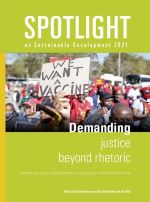Published on Tue, 2021-10-26 17:17
The UN General Assembly (UNGA) began its 76th session in September 2021 with a series of High-level meetings—in both hybrid and in-person formats—under the theme of 'Building Resilience through hope to recover from COVID-19, rebuild sustainably, respond to the needs of the planet, respect the rights of people, and revitalize the United Nations'. As the UN Decade of Action progresses, efforts to secure human, economic, and environmental health are vital. During the UNGA High-level week and throughout the month Member States focused on the need to create a more inclusive future and stronger global cooperation. |
Published on Fri, 2021-09-24 14:26
We are thrilled to invite you to a UNGA76 Side Event titled Multi-lateralism & Multi-stakeholderism: Where does accountability for the corporate sector fit in? When September 24th at 8:00 AM New York / 8:00 PM Beijing / 2:00 PM CET |
Published on Fri, 2021-09-17 10:52
Global civil society report demands justice beyond rhetoric New York, 17 September 2021 Policy responses to the COVID-19 pandemic and resulting economic crisis have greatly exacerbated national and global inequalities. Blatant examples are the unfair distribution of care work, relying mainly on women and poorly remunerated if at all, and the global disparity in the distribution of vaccines. |
Published on Fri, 2021-09-17 00:00
Time to overcome contradictions and hypocrisy in the COVID-19 crisis Friday, 17 September 2021, 9:00-10:30am EDT Policy responses to the COVID-19 pandemic and resulting economic crisis have exacerbated rather than reduced global inequalities. The most visible example of this is the global disparity in the distribution of vaccines. |
Published on Tue, 2021-08-24 14:33
With preparations underway for the Fifth United Nations Conference on the Least Developed Countries (LDC5) being held in 23-27 January 2022, the co-chairs of the Preparatory Committee (PrepCom), have convened two consultations with CSOs, one on 20 May and one on 28 July. Introducing the second consultation, the co-chairs reiterated interest in CSO perspectives and participation throughout the LDC5 process: |
SUSCRIBE TO OUR NEWSLETTER






